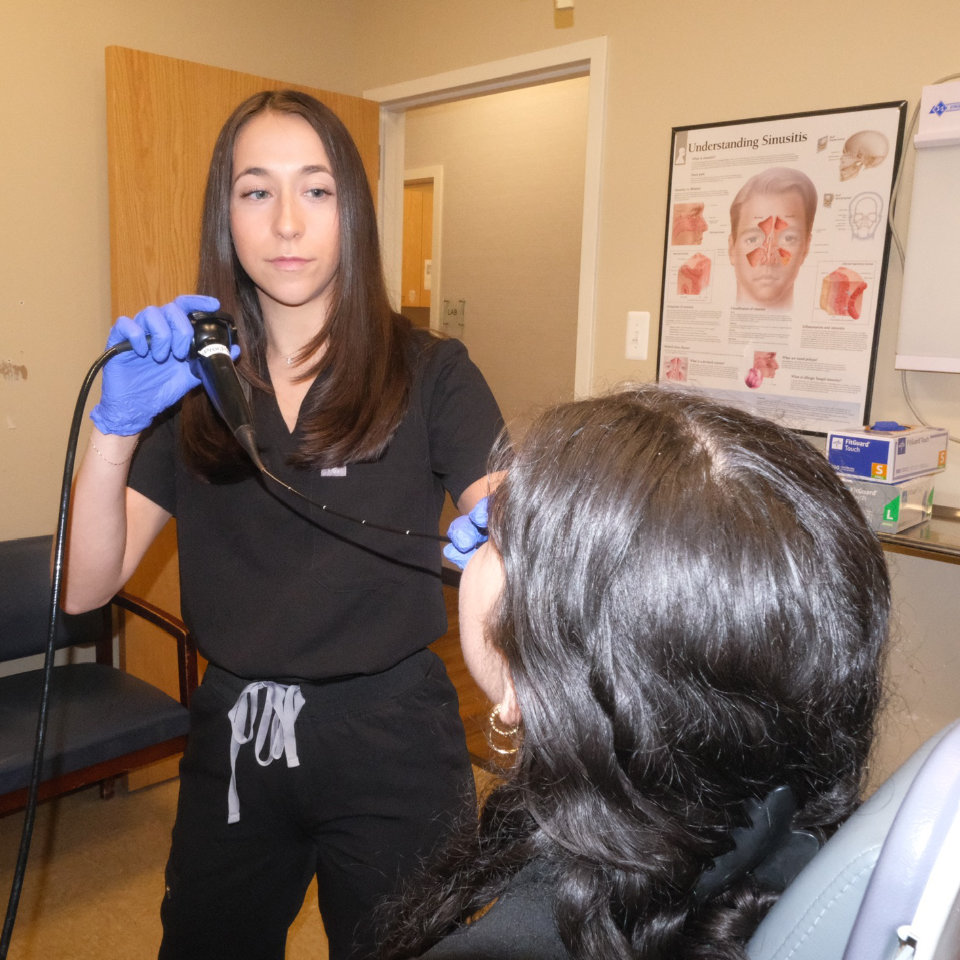Soft, painless growths developing in the lining of the nasal passages or sinuses can significantly impact your breathing, sense of smell, and overall sinus health. These noncancerous growths, known as nasal polyps, often result from chronic inflammation and may block normal airflow and drainage, leading to persistent congestion, postnasal drip, and recurrent infections. At Integrative Ear, Nose & Throat, Dr. Michael Cohen and his team provide comprehensive evaluation and treatment for nasal polyps throughout Long Island, offering both medical management and advanced surgical approaches tailored to each patient’s specific needs.

Specialized Care for Complex Nasal Conditions
Dr. Michael Cohen brings over 25 years of clinical experience and leads a specialized team dedicated to diagnosing and treating nasal polyps and related sinus conditions. As a board-certified otolaryngologist recognized as a Top Doctor by NY Top Docs for 25 consecutive years, he has helped thousands of patients breathe easier through personalized treatment plans addressing both polyps and their underlying causes.
“Nasal polyps represent more than just physical obstructions in the nasal passages,” explains Dr. Cohen. “They’re often manifestations of ongoing inflammatory processes that require comprehensive management beyond simple removal. By addressing both the polyps themselves and the underlying inflammation, we can achieve more lasting results and significantly improve quality of life for our patients.”
Understanding Nasal Polyps
Nasal polyps are teardrop-shaped growths of inflamed tissue that develop in the mucous membranes lining the nose and sinuses. Unlike some growths elsewhere in the body, nasal polyps are not cancerous and typically don’t cause pain. However, they can significantly obstruct nasal passages, impair drainage, and contribute to chronic sinusitis and other respiratory issues.
These inflammatory growths most commonly develop in the area where the sinuses open into the nasal cavity. Small polyps may cause minimal symptoms, but larger growths or clusters of polyps can significantly obstruct airflow and drainage pathways, leading to persistent congestion, recurrent infections, and diminished quality of life.
Approximately 4% of the general population develops nasal polyps, with higher prevalence among those with certain conditions. They’re more common in adults than children and affect men about twice as often as women.
While the exact cause remains unclear, polyps are strongly associated with chronic inflammation of the nasal mucosa and occur more frequently in people with:
- Chronic rhinosinusitis, particularly with eosinophilic inflammation
- Asthma, occurring in up to 40% of patients with polyps
- Aspirin sensitivity or NSAID-exacerbated respiratory disease
- Allergic fungal sinusitis
- Cystic fibrosis
- Certain genetic factors related to immune function
This connection to underlying inflammatory conditions explains why comprehensive management, rather than just polyp removal, is essential for long-term relief.
RhinAer | Chronic Runny Nose Treatment

RhinAer, chronic runny nose treatment, shows significant improvements in chronic runny nose, post-nasal drip, congestion, and other symptoms. Is RhinAer right for you?
Common Symptoms and Impacts
Patients with nasal polyps typically experience a constellation of symptoms that can significantly affect daily functioning:
Persistent Nasal Congestion
This hallmark symptom typically affects both sides of the nose and remains constant despite seasonal changes or standard allergy treatments, often becoming the primary reason patients seek medical care.
Decreased or Lost Sense of Smell
Polyps obstruct the area where olfactory receptors are located, leading to reduced smell (hyposmia) or complete loss (anosmia) that significantly impacts flavor perception and dining enjoyment.
Postnasal Drip
Excessive mucus production results in chronic drainage down the throat, causing frequent throat clearing, persistent cough, hoarseness, and sometimes nausea, particularly in the morning.
Facial Pressure or Pain
Blocked drainage pathways create pressure within the sinuses that manifests as discomfort around the eyes, cheeks, forehead, or between the eyes, often fluctuating in intensity throughout the day.
Recurrent Sinus Infections
Impaired drainage creates conditions favorable for bacterial growth, leading to frequent or persistent sinus infections that respond poorly to antibiotics and often recur shortly after treatment.
Sleep Disturbances
Breathing difficulties typically worsen when lying down, contributing to snoring, mouth breathing, sleep fragmentation, and resulting daytime fatigue that affects work performance and quality of life.
Voice Changes
Altered resonance in the nasal and sinus cavities affects vocal quality, creating a muffled or nasal-sounding voice that others may notice, particularly during phone conversations or professional speaking.
Headaches
Pressure from polyps and associated sinus inflammation frequently causes headaches in the frontal or periorbital regions that may be mistaken for tension headaches or migraines but correlate with nasal symptoms.
The impact of these symptoms extends beyond physical discomfort, often affecting work performance, social interactions, and overall quality of life. Many patients have lived with these symptoms for years, adjusting their activities and expectations rather than seeking specialized treatment.
Comprehensive Management Approach for Nasal Polyps
Dr. Cohen and his team employ a multifaceted approach to nasal polyp treatment that addresses both the polyps themselves and the underlying inflammatory process:
Advanced Diagnostic Evaluation
Our ENT team use several diagnostic methods to thoroughly assess nasal polyps:
- Comprehensive history: Review of your symptoms, medical conditions, and previous treatments
- Nasal endoscopy: Detailed examination using specialized equipment to visualize polyps and surrounding structures
- CT imaging: Advanced scanning provides comprehensive views of the sinuses and precise polyp mapping when appropriate
- Allergy testing: Helps identify specific triggers that may contribute to inflammation in susceptible patients
- Specialized laboratory tests: May help characterize the type and extent of underlying inflammatory processes
Medical Management Strategies
For many patients, especially those with small or medium-sized polyps, medical management provides significant improvement without surgery:
- Topical corticosteroids: Delivered directly to nasal tissues to reduce inflammation and shrink polyps
- Oral corticosteroids: Short courses to rapidly reduce polyp size when symptoms are severe
- Allergy management: Specific strategies when allergies contribute to ongoing nasal inflammation
- Aspirin desensitization: Special protocols for patients with aspirin sensitivity, when appropriate
- Biologic medications: Targeted therapies for specific inflammatory pathways in selected cases
The comprehensive approach to medical management focuses on both symptom relief and addressing the underlying inflammatory process that leads to polyp formation. Our ENT specialists individualize treatment plans based on polyp size, symptom severity, and associated conditions like asthma or allergies.
Surgical Approaches When Needed
When medical management doesn’t provide sufficient relief, surgical intervention may be recommended:
- Endoscopic polypectomy: Precise removal of polyps while preserving healthy tissue
- Functional endoscopic sinus surgery: Addresses associated sinus disease and improves drainage
- Image-guided navigation: Ensures precise instrument positioning in complex cases
- Tissue-sparing techniques: Specialized instruments preserve healthy mucosa during removal
- Outpatient procedure: Allows patients to return home the same day in most cases
Dr. Cohen emphasizes minimally invasive techniques that provide maximum benefit with the least disruption to normal nasal function. The goal is not just polyp removal but creating conditions that reduce the likelihood of recurrence and improve long-term quality of life.
Long-Term Management Strategies
Because nasal polyps often represent an ongoing inflammatory condition, successful management extends beyond initial treatment:
- Maintenance medications: Personalized protocols to prevent polyp recurrence
- Specialized irrigation techniques: Maintain nasal cleanliness and deliver medications effectively
- Trigger management: Ongoing control of allergies or other identified inflammatory factors
- Regular monitoring: Allows early intervention if polyps begin to return
- Comprehensive approach: Addresses both polyps and underlying inflammation
This integrated approach to long-term management helps many patients maintain improvement for years, even though polyps have a natural tendency to recur if the underlying inflammation isn’t adequately controlled.
Is Nasal Polyp Treatment Right for You?
You may be an ideal candidate for nasal polyp evaluation and treatment if you:
Experience Persistent Nasal Congestion
Your nasal blockage doesn’t respond adequately to standard allergy treatments and remains relatively constant regardless of seasons or environments.
Notice Reduced Sense of Smell
You’ve experienced a gradual or sudden decrease in your ability to smell or taste that hasn’t improved over time.
Suffer Frequent Sinus Infections
You develop multiple sinus infections annually that require antibiotics or have sinusitis symptoms that never fully resolve between acute episodes.
Have Relevant Medical History
You have conditions associated with nasal polyps, such as asthma, aspirin sensitivity, or known allergic fungal sinusitis.
Previously Diagnosed With Polyps
You’ve been told you have nasal polyps but haven’t received comprehensive management addressing both the polyps and underlying inflammation.
Find Symptoms Affect Quality of Life
Your nasal and sinus symptoms significantly impact daily activities, sleep quality, or overall well-being.
Seek Long-Term Solutions
You’re interested in addressing not just immediate symptoms but the underlying causes to achieve more lasting improvement.
During your consultation, we will thoroughly evaluate your specific condition and discuss whether medical management, surgical intervention, or a combination approach would be most appropriate for your situation.

What to Expect During Nasal Polyp Treatment
Understanding the treatment process helps patients approach nasal polyp management with realistic expectations:
During Medical Management
If medical treatment is recommended as the primary approach:
- Medication Instruction: Our ENT specialists provide detailed guidance for using prescribed treatments, including specialized techniques for optimal medication delivery
- Regular Monitoring: Follow-up visits allow for assessment of your response and adjustment of the treatment plan as needed
- Variable Timeline: Some medications (oral steroids) produce noticeable improvement within days, while others (nasal steroids, biologics) show gradual improvement over weeks to months
- Collaborative Approach: Throughout treatment, you’ll partner with Dr. Cohen and his team to monitor symptom changes, medication effects, and overall progress
During Surgical Intervention
If surgery is recommended:
- Pre-operative Preparation: Dr. Cohen thoroughly explains the procedure and often prescribes medications to optimize conditions by reducing polyp size before surgery
- Procedure Details: Surgery is typically performed under general anesthesia and lasts approximately 1-3 hours, depending on the extent of polyp disease
- Same-Day Discharge: Following a short recovery period, most patients return home with specific care instructions
- Immediate Benefits: Many patients experience significant breathing improvement right after surgery, though some congestion from surgical swelling is normal
- Smell Improvement: Sense of smell may return rapidly for some patients, while others experience more gradual recovery of this function
Recovery and Follow-Up Care
Recovery following nasal polyp surgery is typically straightforward:
- Saline Irrigation: Gentle rinses help remove debris, blood, and mucus while promoting optimal healing conditions
- Comfort Management: Most patients report minimal pain, typically described as pressure or congestion rather than sharp pain
- Activity Guidelines: While strenuous activity is restricted for 1-2 weeks, most normal activities can be resumed within days
- Follow-up Visits: Regular appointments monitor healing, clean the surgical site as needed, and adjust your treatment plan
- Maintenance Therapy: Ongoing medical management plays a crucial role in preventing polyp recurrence even after successful surgery
Frequently Asked Questions About Nasal Polyps
Small polyps occasionally shrink with aggressive medical management, but established polyps typically don’t resolve completely without intervention. However, medications can often control symptoms and prevent growth even if polyps remain.
No, nasal polyps are benign inflammatory growths. However, other types of nasal masses can occur, which is why proper evaluation by an otolaryngologist is important for any suspected nasal growth.
Recurrence rates vary widely based on the underlying cause, maintenance therapy, and individual factors. With comprehensive management including appropriate post-operative medications, many patients maintain improvement for years, while others may experience recurrence within months without proper follow-up care.
Many patients experience significant improvement in smell after polyp removal, but results vary based on the duration of smell loss, extent of polyp disease, and whether permanent damage to olfactory nerves has occurred. The best results typically occur when treatment is sought before prolonged smell loss.
Rather than considering nasal polyps as a condition with a one-time cure, they’re better understood as a manifestation of underlying inflammatory processes that require ongoing management. Comprehensive treatment can provide long-term control and significant symptom relief for most patients.
Most insurance plans cover both medical and surgical management of nasal polyps when medically necessary. Our office staff will verify your coverage and discuss any potential costs before beginning treatment.
Yes, many patients achieve significant improvement with medical management alone, including topical corticosteroids, short courses of oral steroids, or newer biologic medications. Dr. Cohen thoroughly discusses all appropriate options before recommending surgical intervention.
Why Choose Integrative ENT for Nasal Polyp Treatment
At Integrative ENT, our experienced team of ENT specialists is dedicated to identifying and treating the underlying causes of chronic nasal issues, including nasal polyps. With a patient-first approach, we offer both medical management and advanced in-office procedures to help restore clear, comfortable breathing.
- ENT specialists with decades of combined experience treating nasal and sinus disorders
- Advanced diagnostic tools, including nasal endoscopy and imaging
- Emphasis on medical therapy to reduce inflammation and shrink polyps when possible
- In-office minimally invasive options like polypectomy and balloon sinuplasty
- Ongoing care to manage recurrence and improve long-term sinus health
- Personalized treatment plans based on your unique symptoms and needs
Whether you’re struggling with chronic congestion, loss of smell, or recurrent infections, our team is here to provide long-term relief and support.
Breathe Freely Again with Expert Nasal Polyp Care
Don’t let nasal polyps continue to obstruct your breathing and diminish your quality of life. With proper evaluation and treatment at Dr. Cohen’s practice, you can experience significant relief from nasal congestion, improved sense of smell, and fewer sinus infections. Expert care is available at our convenient offices in Syosset and Port Jefferson, making specialized treatment accessible throughout Nassau and Suffolk County.
Contact our office today to schedule your consultation and take the first step toward breathing freely again.
